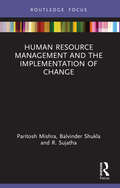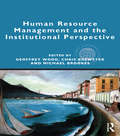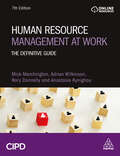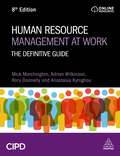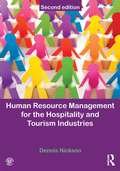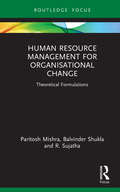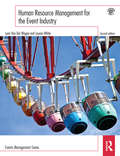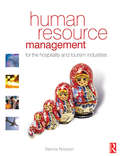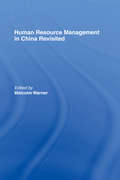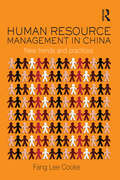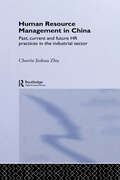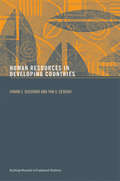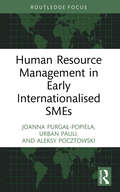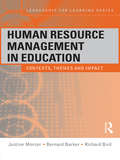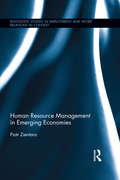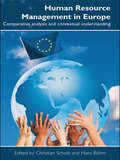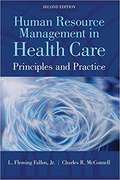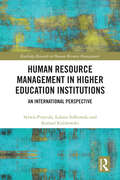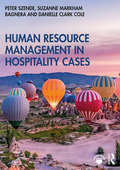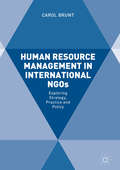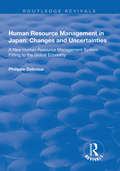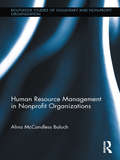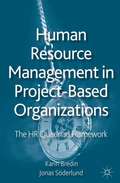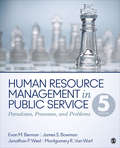- Table View
- List View
Human Resource Management and the Implementation of Change (Routledge Focus on Business and Management)
by Paritosh Mishra Balvinder Shukla R SujathaWith the increased pace of global, economical and technological development, change has become an inevitable feature of any organisation to survive in the competitive market. If it is a planned change process, the HR practitioner can use any of the existing general models or theories of change and use suggestive interventions to increase effectiveness and capability to change itself. When the magnitude of change is unpredictable or the degree of the organisational process or systems is unorganised, the existing models or practice of planned change is still in the formative stage, and there is room for continuous refinement and improvement. This book will bridge this gap in the current organisational development and change literature by benefiting the HR practitioner with six real case studies. The cases bring out the interventions adopted, key activities associated with the successful implementation of interventions and the critical role played by HR in achieving organisational effectiveness. This book captures the transformational journey of a diverse set of companies and weaves various dimensions into a common coherent framework for the field of HRM in Change Management. The case studies illustrate six powerful organisational experiences, listing the major activities contributing to effective change management from motivating change, vision, support from key stakeholders, transition management to organisational and HR commitment for implementation. By demonstrating the role of HR as a ‘change agent,’ this volume will be valuable to researchers, academics, managers and students in the fields of human resource management and change management.
Human Resource Management and the Institutional Perspective (Global HRM)
by Geoffrey Wood Chris Brewster Michael BrookesOne of the most influential debates across business and management studies has centered on the relative impact of institutions on the fortunes of firms and nations. However, analyses have primarily focused on institutional effects on societal features, rather than actual firm practices. This volume brings together recent trends in comparative institutional analysis with a rich body of data on firm-level human resource management practice, consolidating and extending more than a decade of research on the topic. Human Resource Management and the Institutional Perspective explores the overlapping and distinct elements in work and employment relations both within and across country lines. The authors focus on intra-firm relations, internal diversity within varieties of capitalism, and the uneven and experimental nature of systemic change, all the while employing an impressive level of theoretical rigor and empirical evidence. In a single volume, this text unites soundly based, theoretically strong and empirically new chapters that bring advances in institutional theory to bear on the subject of international and comparative human resource management. This book is a valuable resource for students and scholars interested in contemporary developments in institutional theory, the relationship between regulation and practice, and innovation and continuity in human resource management.
Human Resource Management at Work: The Definitive Guide
by Adrian Wilkinson Mick Marchington Rory Donnelly Anastasia KynighouA leading textbook in its field, Human Resource Management at Work is a comprehensive guide to the theory and practice of HRM. Divided into four key parts, the first part of the book covers HRM strategy and the global context, the forces shaping HRM at work and international and comparative HRM. Part Two discusses the role of HR professionals and line managers in the workplace, and how the responsibilities for delivering effective HR vary in a changing world of work, Part Three has expert coverage of the key areas of HR including resourcing and talent management, learning and development (L&D), reward and employment relations. The final part examines the impact that HRM can have on business performance and also outlines the key knowledge and skills required to carry out a business research project. Fully updated through, this seventh edition now has new coverage of diversity and inclusion (D&I), workplace analytics, ethics, wellbeing and precarious work as well as additional coverage of the alignment of HRM with organisational strategy and the integration of different components of HRM. Human Resource Management at Work includes new global case studies, reflective practice activities to encourage critical thinking, exercises to help the consolidation of learning and 'explore further' boxes to encourage wider reading. Aligned to the CIPD Level 7 qualification yet also relevant on non-CIPD accredited HR masters courses, this book covers everything students need to excel in their academic studies and will ensure that they can hit the ground running in a practitioner role after university. Online supporting resources include an instructor's manual and lecture slides.
Human Resource Management at Work: The Definitive Guide
by Adrian Wilkinson Mick Marchington Rory Donnelly Anastasia KynighouHuman Resource Management at Work is a comprehensive guide to the theory and practice of HRM, covering everything HR students need to excel in their academic studies.This leading textbook is divided into four key parts. The first part of the book covers HRM strategy and the global context, whilst Part Two discusses the role of HR professionals and line managers in the workplace and how the responsibilities for delivering effective HR varies in a changing world of work. Part Three has expert coverage of the key areas of HR including resourcing and talent management, learning and development (L&D), reward and employment relations. The final part examines the impact that HRM can have on business performance and also outlines the key knowledge and skills required to manage a business project. This updated edition now has coverage of artificial intelligence, HR ecosystems, equal value and pay ethics and the new approaches to project management. It also includes international real-world examples, reflective practice activities to encourage critical thinking, exercises to help the consolidation of learning and 'explore further' boxes to encourage wider reading.This book is for students taking the CIPD Level 7 qualification and is also for non-CIPD accredited HR postgraduate students. Online supporting resources include an instructor's manual and lecture slides.
Human Resource Management for Hospitality, Tourism and Events
by Dennis NicksonPlease note: this title will publish in January 2012. This textbook explores the policies and practices employed in the management of people working in the tourism, hospitality and events industries. It considers the nature of these industries and the varied approaches that organizations take with the handling of matters such as recruitment, health and welfare and remuneration. This book is enriched with topical case studies that describe and illustrate the human resource management behaviour of airlines, hotel chains and other international companies in the sector, providing real world industry perspective. With a clear, reader friendly layout containing chapter outlines and objectives and examples of best practice, this is the ideal guide to HRM for any student on a hospitality, tourism or related course.
Human Resource Management for Organisational Change: Theoretical Formulations (Routledge Focus on Business and Management)
by R. Sujatha Paritosh Mishra Balvinder ShuklaChange can take place in various forms, gradual or abrupt, incremental or transformational. It is a requirement in modern day society that everyone, whether at individual or organisational level, understands the softer nuances of this concept and prepares for it. During scenarios of change interventions, the role of human resources (HR) becomes highly crucial, even as the perception towards it becomes ambivalent. This volume delivers a holistic view on the role of HR in organisational change. It is built on the various theoretical models of change and provides a dramatic sequence of issues in change management to gain a big picture thinking for HR managers and weaves through why, how and what perspectives to change management. Human Resources Management for Organisational Change offers a comprehensive coverage of the changing role of HR as it relates to organisational change theories and models, strategy, changing business environment and implications, organisational culture, leadership, resistance management, and high performance work practices (HPWP) to support change management and cost of no-changers. It is unique in that it covers the entire gamut of organisational change as well as HR. It will be of value to researchers, academics, professionals, and students interested in learning more about how organisational change can improve productivity and human satisfaction as well as the systematic approach to managing organisational change.
Human Resource Management for the Event Industry (Events Management)
by Lauren White Lynn Van Der WagenHuman Resource Management for Events still remains the only text to introduce students to the unique application of HR principles in the context of a highly complex event environment. Linking theory, research and application it looks at the purpose and processes of managing such a sizable & varied workforce in a highly pressured environment through the differing and various types of events from sporting to arts to business events.Since the first edition, there have been many important developments in this field and this second edition has been completely revised and updated in the following ways: extensively updated content to reflect recent issues and trends including: labour markets and industry structure, impacts of IT and social media, risk management, volunteer motivation, talent management, equal opportunities and managing diversity. All explored specifically within the Events Industry extended volunteer chapter, including new material on ethics, volunteer motivation and satisfaction. a new chapter on Internal Communications, looks at how an effective internal communication plan can be achieved which is a critical part of HR strategy in the unique event environment. updated and new international case studies throughout to explore key issues and show real life applications of HRM in the Events Industry. supported with new lecturer and students online resources including: power point slides, suggested answers to review questions, web & video links to additional resources and a student test bank. Written in a user friendly style, each chapter includes international examples, bulleted lists, guides to further reading and exercises to test knowledge.
Human Resource Management for the Hospitality and Tourism Industries
by Dennis NicksonHuman Resource Management for the Hospitality and Tourism Industries takes an integrated look at HRM policies and practices in the tourism and hospitality industries. Utilising existing human resource management (HRM) theory and practice, it contextualises it to the tourism and hospitality industries by looking at the specific employment practices of these industries, such as how to manage tour reps or working in the airline industry.It initially sets the scene with a broad review of the evidence of HRM practice within the tourism and hospitality industries. Having identified the broader picture, the text then begin to focus much more explicitly on a variety of HR policies and practices such as:* recruitment and selection: the effects of ICT, skills required specific for the industry and the nature of advertising* legislation and equal opportunities: illegal discrimination and managing diversity * staff health and welfare: violence in the workplace, working time directives, smoking and alcohol and drug misuse* remuneration strategies in the industry: the 'cafeteria award' approach, minimum wage and tippingHuman Resource Management for the Hospitality and Tourism Industries is illustrated throughout with both examples of best practice for prescriptive teaching and discussion, and international case studies to exercise problem solving techniques and contextualise learning. It incorporates a user friendly layout and includes pedagogic features such as: chapter outlines and objectives, HRM in practice - boxed examples, reflective review questions, web links' discussion questions and further reading.Accompanying the text are online supplementary lecturer materials including downloadable figures from the book, PowerPoint slides, further cases and extra exercises and points for discussion.
Human Resource Management in China Revisited
by Malcolm WarnerThis edited volume first considers the economic background of the recent changes in HRM in the People's Republic of China from 1978 to the present day, exploring the change from a command economy to a more market-led one. It then goes on to look at the demise of so-called 'iron rice bowl' policy once dominated by a Soviet-inspired Personnel Management model to one now characterized by possibly Japanese, as well as Western-influenced HRM, albeit with what are widely described as 'Chinese characteristics'. Finally, it concludes with a comparative analysis of the contributions in the book on China vis-a-vis an appraisal of these with the national HRM systems of Japan and South Korea. This volume was previously published as a special issue of the International Journal of Human Resource Management.
Human Resource Management in China: New Trends and Practices (Routledge Studies In The Growth Economies Of Asia Ser.)
by Fang Lee CookeThe approach to managing human resources has changed significantly in China over the last twenty-five years as its transformation from a state planned economy to a market-oriented economy continues. By adopting a broad notion of HRM, while remaining sympathetic to the strong emphasis on relationship management in the Chinese culture, Fang Lee Cooke builds on the foundations of traditional Chinese HRM practice and brings it right up to date, including analysis of currently under-explored issues such as diversity management, talent management, new pay schemes, and performance management. Including extensive first hand empirical data and pedagogical features such as vignettes, case studies, and further reading lists. This book will be of great use on upper level undergraduate, post graduate and MBA courses covering international/Chinese management and HRM as well as appealing to practitioners, students and scholars of Chinese Business, Asian Business and Human Resource Management.
Human Resource Management in China: Past, Current and Future HR Practices in the Industrial Sector (Routledge Advances in Asia-Pacific Business #Vol. 12)
by Cherrie Jiuhua ZhuEnhancing our understanding of HRM in the Chinese industrial sector, this book explores the emerging role of HRM in China's industrial enterprises. A significant contribution to the theory of HRM, this book will be essential reading for students and researchers of Business and Management, HRM and Asian Business.
Human Resource Management in Developing Countries (Routledge Research in Employment Relations #Vol. 5)
by Pawan S. Budhwar Yaw A. DebrahFocusing on HRM developments in thirteen developing countries across Asia, Africa and the Middle East, this book explores the contextual functions of HR in these countries. In addition, it analyzes the more general issues of HRM in cross-national settings to give readers an understanding of HR that is both comparative and contextual. Covering the policies and practices of China, South Korea, Taiwan, India, Nepal, Pakistan, Iran, Saudi Arabia, Algeria, Nigeria, Ghana, Kenya and South Africa, each chapter follows a framework that draws out all of the unique and diverse configurations of HRM. This important text is an invaluable resource for all HRM practitioners, students and scholars of HRM, international HRM and international business.
Human Resource Management in Early Internationalised SMEs (Routledge Focus on Business and Management)
by Aleksy Pocztowski Urban Pauli Joanna Purgał-PopielaSmall- and medium-sized enterprises (SMEs) are increasingly viewed as valuable contributors to the global economy, which translates into their importance in business literature and academic research. Recent studies suggest that there exists a substantial variety of international activities pursued by SMEs expanding abroad, with a prominent presence of early internationalised enterprises, including born global. Despite the acknowledgement of the importance of human capital for SME internationalisation, there is a persistent knowledge gap concerning HR practices in this context. Until now, researchers investigating the accelerated internationalisation of SMEs have focused either on the human capital of decision-makers or selected attributes of employees, although these have only been at the pre-entry or entry stages. Thus, activities performed after entering foreign markets remain. This book attempts to reduce this gap and contribute to the body of knowledge concerning HR practices in early internationalised SMEs with an emphasis on the post-entry phase. By taking such an approach, this volume integrates two streams of research: HRM in the SMEs and international business. It provides managers of SMEs with useful information on dealing with internationalisation-related challenges by means of various practices including work structuring, recruitment and selection, training and development, employee appraisal and remuneration, and performance management. The discussion of these issues is based upon data from a survey conducted in 200 SMEs and case studies exemplifying HR practices in early internationalised small and medium enterprises. It offers academic researchers, postgraduate students, and reflective practitioners a state-of-the-art overview of managing human resources in small and medium enterprises expanding internationally, including both accelerated and incremental paths.
Human Resource Management in Education: Contexts, Themes and Impact (Leadership for Learning Series)
by Richard Bird Justine Mercer Bernard BarkerThe study of educational leadership makes little sense unless it is in relation to who the leaders are, how they are leading, what is being led, and with what effect. Based on the premise that learning is at the heart of leadership and that leaders themselves should be learners, the Leadership for Learning series explores the connections between educational leadership, policy, curriculum, human resources and accountability. Each book in the series approaches its subject matter through a three-fold structure of process, themes and impact. Series Editors - Clive Dimmock, Mark Brundrett and Les Bell The effects of globalization are evident in education policy around the world. Governments from the United States to China are driving their education systems to produce more skilled, more flexible, more adaptable employees. The pressure to perform is all-pervasive, meaning present-day leaders have to go beyond the principles of humane and equitable management practice and look for a competitive advantage through strategies that enhance motivation, build capacity for organizational improvement, and produce better value-added performance. Human Resource Management in Education debates the fundamental question of how far effective human resource management policies can enable schools and colleges to transcend the paradoxes of the global reform agenda. It analyses the relationship between leadership, the classroom and results, and uses case studies to explore the extent to which performance is enhanced by distributed leadership and constrained by social, political and economic contexts. The book is divided into three parts: examining the current context of human resource management, by critically analysing globalization, human capital theory, and worldwide trends in government legislation, societal values, and teacher culture(s); exploring two pairs of contemporary themes in human resource management, by comparing the roles of leaders and followers, on the one hand, and contrasting learning and greedy organizations, on the other; looking at how the context and the themes impact on particular contemporary practices in human resource management, by analysing the selection and development of professionals, the remodelling of school teams and the management of performance. The authors carefully blend advocacy with evidence to ensure relevance for both practitioner and academic audiences across the globe. The book would be of particular use to students on masters courses in educational leadership.
Human Resource Management in Emerging Economies (Routledge Studies in Employment and Work Relations in Context)
by Piotr ZientaraThe demise of communism in 1989 in eastern Europe, followed by the break-up of the Soviet Union and the spectacular rise of China and India in the 1990s, brought about a new world order. In eastern Europe communism not only caused large-scale impoverishment and technological slowing, but also signified managerial wastefulness and disregard for employee voice. Yet, since the collapse of the old system, 25 years has passed and things have dramatically improved. Crucially, much has changed in the workplace: a transfer of modern HRM thought led to a shift in the way employees were treated. Human Resource Management in Emerging Economies explores – by means of qualitative and quantitative research methods – the problematics of human resource management in post-communist emerging economies. It also focuses on such interrelated issues as privatisation, trade-unionism, corporate social responsibility, work-life balance and senior employment. The book adopts a multidisciplinary perspective, referring to theories and concepts associated with management, economics, occupational psychology and sociology. Moreover, it contextualises the discussion by including a politico-historical background, and substantiates its claims with findings from empirical research. This book’s multi-faceted approach reflects the complex nature of the subject matter, allowing readers to develop a better understanding of the idiosyncrasies of employment relations in eastern Europe.
Human Resource Management in Europe: Comparative Analysis And Contextual Understanding
by Christian Scholz Hans BöhmThe European Union is expanding. Wide cultural, political and economic differences within the Union have a significant impact on the management of human resources, so crucial to the success of any enterprise. Businesses within the EU have regularly tried to re-evaluate the context in which they work, and for investors from other continents, no
Human Resource Management in Health Care
by L. Fleming Fallon Charles R. McConnellThis practical, hands-on book introduces human resources to those who are preparing to work in any area of health care or health service. Written for practitioners and students in all disciplines related to health, it covers important topics such as recruitment, training, termination, legal issues, labor unions, and more. Each chapter is introduced by a case study related to the material that follows. The case study is resolved at the conclusion of each chapter along with expert commentary and practical suggestions that can be used in the real world. Chapters also feature learning objectives, discussion points, and questions to ponder. Many examples and a number of sample forms and documents are included. <P><P> The Second Edition has been completely re-organized to reflect a better chapter flow and organization. It also offers: • All data updated throughout • New section on health care legislation • New section in each chapter, “Customer Service Box”, that emphasizes the importance of customer service in the context of the material presented in the chapter. • Completely revised instructor ancillary material.
Human Resource Management in Higher Education Institutions: An International Perspective (Routledge Research in Human Resource Management)
by Łukasz Sułkowski Sylwia Przytuła Konrad KulikowskiIn an era marked by increasing globalization, international competition, digitalization, and social and cultural changes, higher education institutions (HEIs) play a pivotal role in establishing the knowledge-based economy of each country, which is perceived as its soft power. The need to explore and highlight the specificity of human resource management (HRM) practices in higher education institutions has become urgent and evident. This book provides new theoretical and practical insights into HRM in HEIs. A profound analysis of the global literature clearly exposes that human resource practices are often applied in academia as single solutions rather than as a systematic approach to planning, attracting, motivating, developing, and retaining scientists. The global trends in academia, such as the need for branding and positioning in higher education ranking systems, growing retention and brain circulation between academia and business, diversity in academia, and the digitalization of teaching, have resulted in challenges such as de-recruitment, academic burnout and ill-being, and technostress, which are also addressed in this book.
Human Resource Management in Hospitality Cases
by Peter Szende Suzanne Markham Bagnera Danielle Clark ColeHuman Resource Management in Hospitality Cases adopts a practical case-based approach to develop critical thinking and problem-solving skills in future hospitality managers. Using tried-and-tested real-life scenarios, this book thoroughly prepares hospitality students for a career in the field. Chapters are comprised of 75 short vignettes, split into nine sections that reflect and cover the primary challenges facing hospitality managers on a daily basis, including leadership credibility, building and managing employee performance, managing a diverse workforce, dealing with problem behaviors, and many others, all contextualised within the hospitality industry. With a main "think point" and series of questions for each case, the book is a highly insightful and engaging read. Suggested answers and solutions to the questions can be found within the extensive online resources that complement the book. Each section is also contextualized and theorized with an additional reading section, organized by key concept. This book will be essential for all students of hospitality and an invaluable resource for current practitioners in the field as well.
Human Resource Management in International NGOs
by Carol BruntThis insightful book examines human resource management practice and its perceived impact on performance in the non-profit sector. Presenting case studies of six NGOs in Kenya, it explores HRM practices in a non-profit setting, and uncovers details about HRM practice by organizations in the development sector that are not found in NGO management books. Informed by the author's practical experience in the field, Human Resource Management in International NGOs is a unique study that marries theory and practice, challenging the reader to reflect on the interpretative application of management theory and stakeholder participation.
Human Resource Management in Japan: Changes and Uncertainties - A New Human Resource Management System Fitting to the Global Economy (Routledge Revivals Ser.)
by Philippe DebrouxThis title was first published in 2003. Seeking to demonstrate a high level of insight, this is an analysis of the characteristics and advantages of Japanese human resource management. It describes the situation and the main trends in the transformation of the Japanese human resource management and employment practices, and investigates the possible options for the future. The work should be useful to academics and policy makers dealing with Japan and courses on human resource management and economics.
Human Resource Management in Nonprofit Organizations (Routledge Studies in the Management of Voluntary and Non-Profit Organizations)
by Alina McCandless BaluchHuman resource management (HRM) can aid nonprofit organizations (NPOs) in facing uncertain, changing environments of funding pressures, increasing competition and demand for services as well as internal challenges. As the distinguishing features of NPOs can render the professionalization of HRM different from the private and public sectors, this book fills a gap in the literature by offering an in-depth look at how this distinctive nature of NPOs shapes the development and implementation of their HR practices. Timely and topical, this book addresses the professionalization of HRM in the nonprofit sector using examples from an exploratory multiple case study of NPOs selected across different fields. Not only does it offer both students and practitioners in the field of HRM and nonprofit management a better understanding of the specific challenges for HRM that stem from the management of several, contradictory bottom lines in NPOs, but it also highlights the opportunities that distinguishing nonprofit features create for the development and implementation of HR practices. By illustrating how NPOs can invest in learning and adapting processes that aid them in the alteration of HRM, this book is an essential resource for those involved in designing, implementing and studying HRM in NPOs.
Human Resource Management in Project-Based Organizations
by Karin BredinPresenting findings from research into Sweden's leading multinationals this book focuses on engineering companies operating in global industries such as pharmaceutical, aerospace, packing systems and automotive. It explores research and practice within the area of HRM focusing on project-based organizations.
Human Resource Management in Public Service: Paradoxes, Processes, and Problems
by Dr James S. Bowman Dr Jonathan P. West Evan M. Berman Dr Montgomery R. Van WartHuman Resource Management in Public Service: Paradoxes, Processes, and Problems offers managers and aspiring managers a thorough, provocative, and award-winning coverage of the complex issues of management in the public sector, from both employee and managerial viewpoints. Combining more than 100 years of professional and academic experience, authors Evan M. Berman, James S. Bowman, Jonathan P. West, and Montgomery Van Wart have created user-friendly and accessible material by highlighting dilemmas, challenging readers to resolve them, and enticing them to go beyond the text to discover and confront other dilemmas. Grounded in real public service experiences, the book emphasizes hands-on skill building and problem solving. Continuing the award-winning tradition of previous editions, this Fifth Edition covers all of the stages of the employment process, including recruitment, selection, training, legal rights and responsibilities, compensation, and appraisal.
Human Resource Management in Public Service: Paradoxes, Processes, and Problems
by Dr James S. Bowman Dr Jonathan P. West Evan M. Berman Dr Montgomery R. Van WartHuman Resource Management in Public Service: Paradoxes, Processes, and Problems offers managers and aspiring managers a thorough, provocative, and award-winning coverage of the complex issues of management in the public sector, from both employee and managerial viewpoints. Combining more than 100 years of professional and academic experience, authors Evan M. Berman, James S. Bowman, Jonathan P. West, and Montgomery Van Wart have created user-friendly and accessible material by highlighting dilemmas, challenging readers to resolve them, and enticing them to go beyond the text to discover and confront other dilemmas. Grounded in real public service experiences, the book emphasizes hands-on skill building and problem solving. Continuing the award-winning tradition of previous editions, this Fifth Edition covers all of the stages of the employment process, including recruitment, selection, training, legal rights and responsibilities, compensation, and appraisal.
